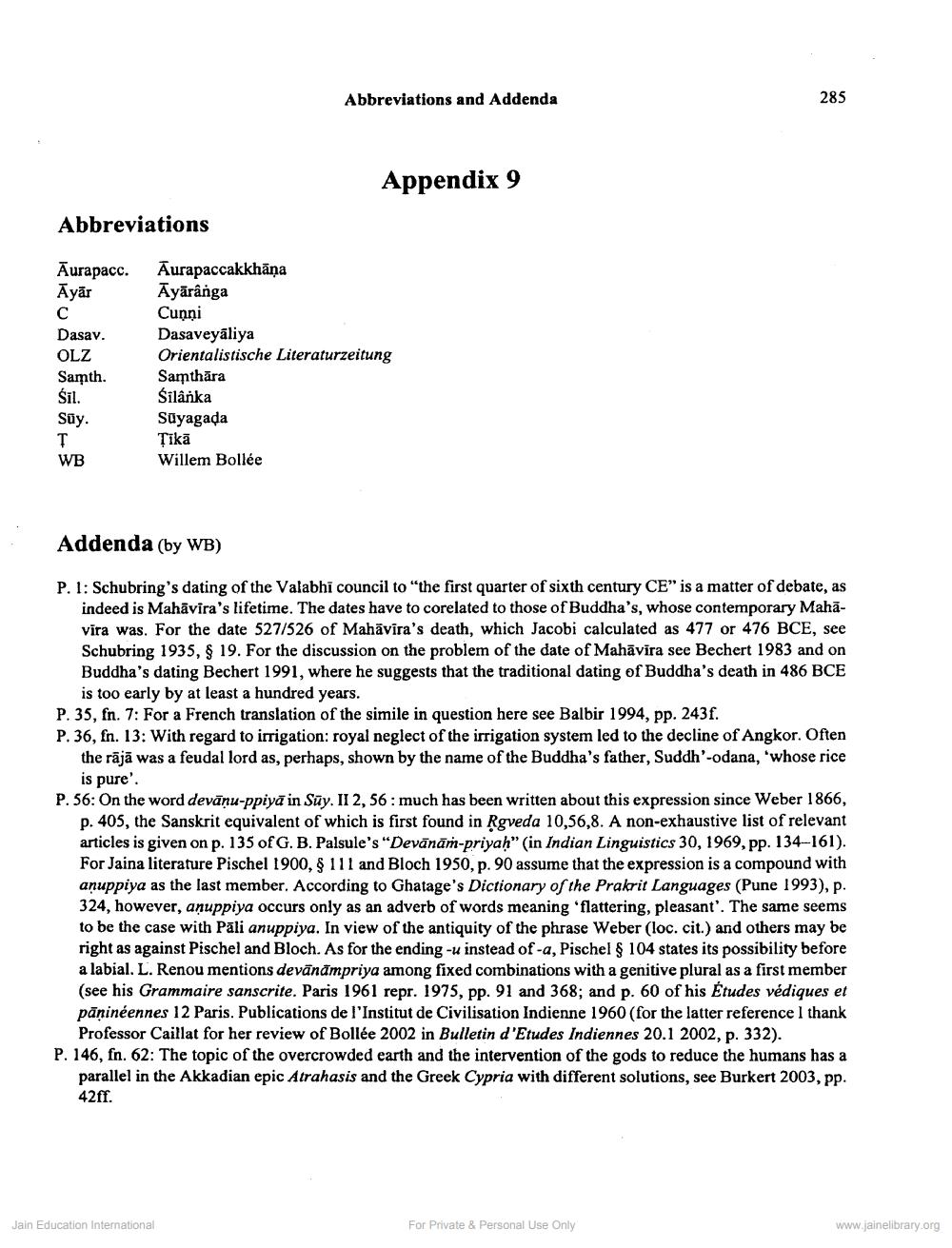________________
Abbreviations
Aurapacc.
Ayär
с
Dasav.
OLZ
Samth.
Śil.
Suy.
T
WB
Aurapaccakkhāṇa Ayärânga
Cunni
Jain Education International
Samthara
Šilänka
Sayagada
Abbreviations and Addenda
Dasaveyaliya
Orientalistische Literaturzeitung
Tikā
Willem Bollée
Appendix 9
Addenda (by WB)
P. 1: Schubring's dating of the Valabhi council to "the first quarter of sixth century CE" is a matter of debate, as indeed is Mahavira's lifetime. The dates have to corelated to those of Buddha's, whose contemporary Mahāvira was. For the date 527/526 of Mahavira's death, which Jacobi calculated as 477 or 476 BCE, see Schubring 1935, § 19. For the discussion on the problem of the date of Mahavira see Bechert 1983 and on Buddha's dating Bechert 1991, where he suggests that the traditional dating of Buddha's death in 486 BCE is too early by at least a hundred years.
P. 35, fn. 7: For a French translation of the simile in question here see Balbir 1994, pp. 243f.
P. 36, fn. 13: With regard to irrigation: royal neglect of the irrigation system led to the decline of Angkor. Often the rājā was a feudal lord as, perhaps, shown by the name of the Buddha's father, Suddh'-odana, 'whose rice is pure".
P. 56: On the word devāṇu-ppiyā in Sūy. II 2, 56: much has been written about this expression since Weber 1866, p. 405, the Sanskrit equivalent of which is first found in Ṛgveda 10,56,8. A non-exhaustive list of relevant articles is given on p. 135 of G. B. Palsule's "Devānām-priyaḥ" (in Indian Linguistics 30, 1969, pp. 134-161). For Jaina literature Pischel 1900, § 111 and Bloch 1950, p. 90 assume that the expression is a compound with anuppiya as the last member. According to Ghatage's Dictionary of the Prakrit Languages (Pune 1993), p. 324, however, aṇuppiya occurs only as an adverb of words meaning 'flattering, pleasant'. The same seems to be the case with Pali anuppiya. In view of the antiquity of the phrase Weber (loc. cit.) and others may be right as against Pischel and Bloch. As for the ending -u instead of -a, Pischel § 104 states its possibility before a labial. L. Renou mentions devanāmpriya among fixed combinations with a genitive plural as a first member (see his Grammaire sanscrite. Paris 1961 repr. 1975, pp. 91 and 368; and p. 60 of his Études védiques et pāṇinéennes 12 Paris. Publications de l'Institut de Civilisation Indienne 1960 (for the latter reference I thank Professor Caillat for her review of Bollée 2002 in Bulletin d'Etudes Indiennes 20.1 2002, p. 332).
P. 146, fn. 62: The topic of the overcrowded earth and the intervention of the gods to reduce the humans has a parallel in the Akkadian epic Atrahasis and the Greek Cypria with different solutions, see Burkert 2003, pp. 42ff.
285
For Private & Personal Use Only
www.jainelibrary.org




